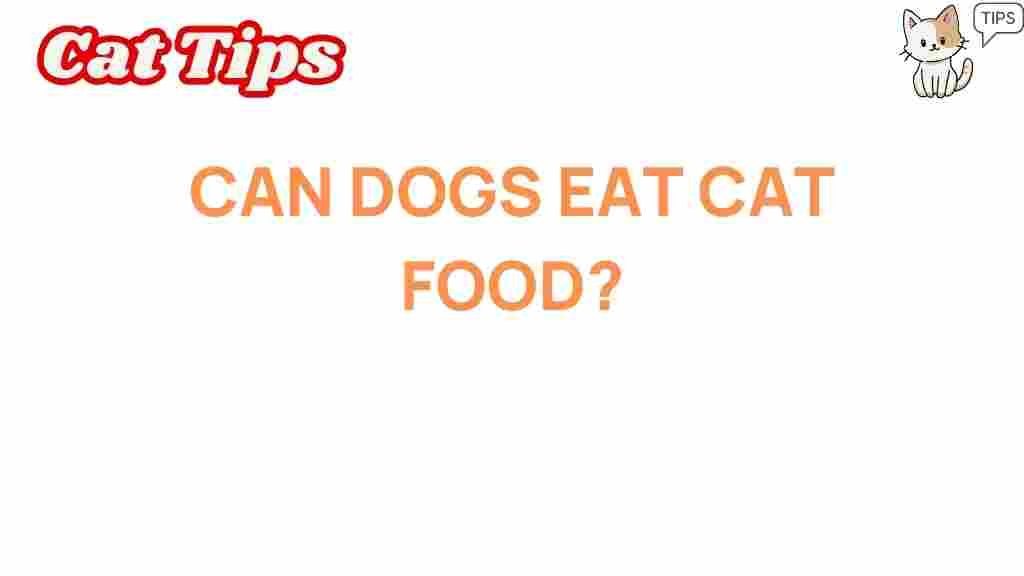Can Dogs Eat Cat Food? Understanding the Risks and Realities for Dogs
As a pet owner, it’s common to see our furry friends sharing a bowl or two. You might find your dog sneaking a bite of cat food when given the chance, leading to the question: can dogs eat cat food? While it may seem harmless, there are several factors to consider regarding the health and well-being of your dog. In this article, we will explore the implications of dogs eating cat food, the nutritional differences between dog food and cat food, and what you should do if your dog consumes cat food.
The Nutritional Differences Between Dog Food and Cat Food
Understanding the differences in nutrition can help us answer the question of whether dogs can safely consume cat food. Here are some vital points to consider:
- Protein Content: Cat food typically contains a higher protein content than dog food. Cats are obligate carnivores, meaning they require a diet rich in animal proteins. Dogs, on the other hand, are omnivores and need a more balanced diet that includes both animal proteins and plant-based nutrients.
- Taurine: Cats need taurine, an essential amino acid that dogs can produce on their own. While dogs can eat cat food occasionally, a diet lacking taurine might not meet their needs.
- Fat Levels: Cat food often has higher fat levels, which can lead to obesity or pancreatitis in dogs if consumed excessively.
- Vitamins and Minerals: Dog food is formulated to meet the specific dietary needs of dogs, while cat food is designed for cats. This means that the vitamins and minerals in cat food may not be suitable for dogs.
Why Do Dogs Eat Cat Food?
Curiosity is one reason dogs might eat cat food. However, there are other factors that could lead dogs to seek out cat food:
- Smell and Taste: Cat food often has a stronger aroma and flavor than dog food, making it more appealing to dogs.
- Competition: If dogs see or smell cat food, they may feel compelled to eat it, especially if they think they are missing out.
- Hunger: If a dog is hungry and cat food is more accessible, they may not hesitate to indulge.
The Risks of Feeding Dogs Cat Food
While occasional consumption of cat food might not harm dogs, there are several risks associated with making it a part of their diet:
- Obesity: The high-fat content in cat food can lead to weight gain in dogs, especially if they consume it regularly.
- Pancreatitis: The increased fat intake can also result in pancreatitis, a serious condition that requires immediate veterinary attention.
- Nutritional Deficiencies: Long-term consumption of cat food can lead to nutritional deficiencies in dogs, as they may not receive the right balance of nutrients essential for their health.
- Digestive Upset: Dogs might experience gastrointestinal issues, including diarrhea or vomiting, after consuming cat food.
What to Do If Your Dog Eats Cat Food
If you catch your dog in the act of eating cat food, here’s a step-by-step approach to handle the situation:
- Assess the Amount: Determine how much cat food your dog has eaten. A small amount may not pose a significant risk.
- Observe for Symptoms: Watch for any signs of digestive upset, such as vomiting or diarrhea, over the next few hours.
- Provide Fresh Water: Ensure your dog has access to fresh water to help flush out their system.
- Contact Your Veterinarian: If your dog exhibits signs of distress or has eaten a large quantity of cat food, consult your veterinarian for guidance.
Preventing Dogs from Eating Cat Food
To prevent dogs from munching on cat food, consider implementing the following strategies:
- Separate Feeding Areas: Feed your cat in a separate room or elevated area that your dog cannot access.
- Supervise Feedings: Keep an eye on both pets during feeding times to prevent theft of food.
- Use Baby Gates: Install baby gates to restrict your dog’s access to the area where the cat is fed.
- Train Commands: Teach your dog commands such as “leave it” to help them resist the temptation of cat food.
Troubleshooting Tips for Pet Owners
If your dog continues to seek out cat food despite your best efforts, consider these troubleshooting tips:
- Evaluate Your Dog’s Diet: Ensure your dog is receiving a balanced diet that satisfies their nutritional needs. Consult your veterinarian for recommendations.
- Monitor Behavior: If your dog seems excessively hungry or is begging for food, it might indicate an issue with their diet or health.
- Provide More Enrichment: Increase mental and physical stimulation for your dog to reduce boredom, which could lead to food-seeking behavior.
Conclusion: Can Dogs Eat Cat Food?
In conclusion, while dogs can eat cat food occasionally without immediate harm, it is not advisable for long-term consumption. The nutritional differences, along with potential health risks such as obesity and pancreatitis, highlight the importance of feeding your dog a balanced diet specifically formulated for their needs. If your dog does eat cat food, monitor their behavior and consult your veterinarian if any concerning symptoms arise.
By taking proactive steps to prevent your dog from accessing cat food and ensuring they receive proper nutrition, you can help maintain their health and well-being. For more information on pet nutrition, check out this helpful resource.
For any specific concerns regarding your dog’s dietary habits, consider consulting a veterinarian. A professional can provide tailored advice for your pet’s unique needs. Remember, a happy dog is a healthy dog!
This article is in the category Health and created by CatTips Team
